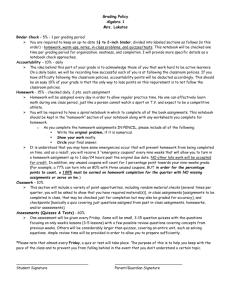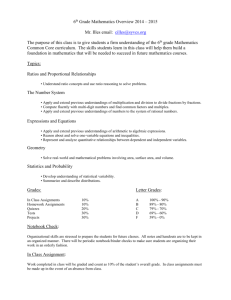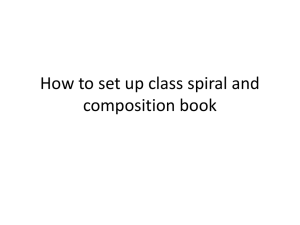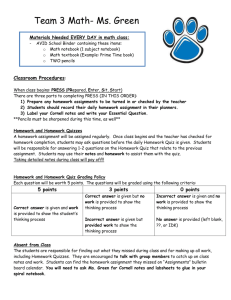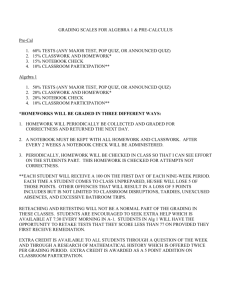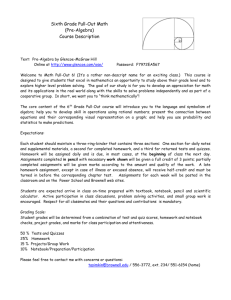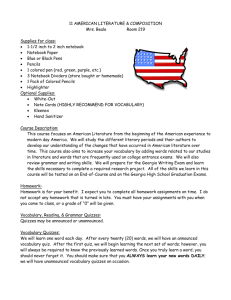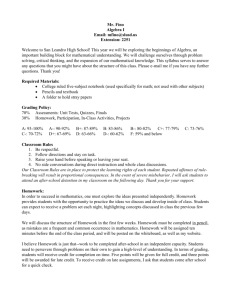Plane Geometry Course Syllabus
advertisement
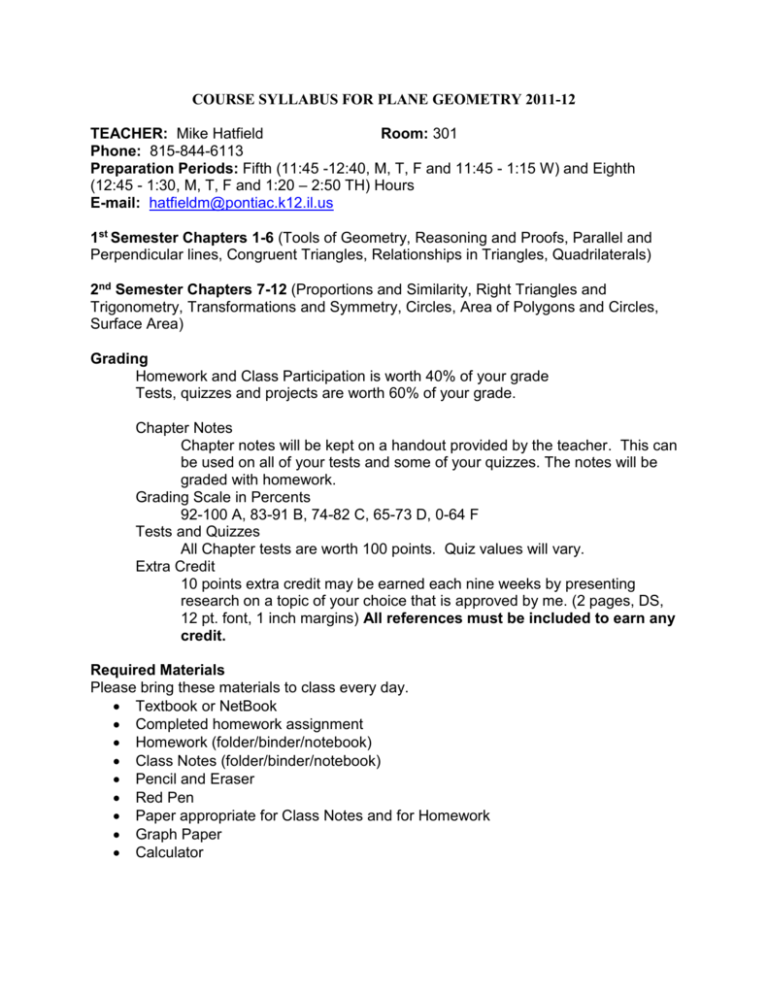
COURSE SYLLABUS FOR PLANE GEOMETRY 2011-12 TEACHER: Mike Hatfield Room: 301 Phone: 815-844-6113 Preparation Periods: Fifth (11:45 -12:40, M, T, F and 11:45 - 1:15 W) and Eighth (12:45 - 1:30, M, T, F and 1:20 – 2:50 TH) Hours E-mail: hatfieldm@pontiac.k12.il.us 1st Semester Chapters 1-6 (Tools of Geometry, Reasoning and Proofs, Parallel and Perpendicular lines, Congruent Triangles, Relationships in Triangles, Quadrilaterals) 2nd Semester Chapters 7-12 (Proportions and Similarity, Right Triangles and Trigonometry, Transformations and Symmetry, Circles, Area of Polygons and Circles, Surface Area) Grading Homework and Class Participation is worth 40% of your grade Tests, quizzes and projects are worth 60% of your grade. Chapter Notes Chapter notes will be kept on a handout provided by the teacher. This can be used on all of your tests and some of your quizzes. The notes will be graded with homework. Grading Scale in Percents 92-100 A, 83-91 B, 74-82 C, 65-73 D, 0-64 F Tests and Quizzes All Chapter tests are worth 100 points. Quiz values will vary. Extra Credit 10 points extra credit may be earned each nine weeks by presenting research on a topic of your choice that is approved by me. (2 pages, DS, 12 pt. font, 1 inch margins) All references must be included to earn any credit. Required Materials Please bring these materials to class every day. Textbook or NetBook Completed homework assignment Homework (folder/binder/notebook) Class Notes (folder/binder/notebook) Pencil and Eraser Red Pen Paper appropriate for Class Notes and for Homework Graph Paper Calculator Homework Because homework is a valuable and integral component of successful mathematics learning experiences, daily homework assignments in PTHS mathematics courses are designed to: help students review, reinforce, and extend the mathematics concepts and skills learned in the classroom; provide students regular feedback about their learning progress; motivate students to be accountable and responsible for learning the material; offer parents opportunities to interact with their sons and daughters about their ongoing learning activities; meet the needs of diverse student capabilities and various mathematics course levels; and serve as a significant component in the determination of each student’s course grade. I will assign homework virtually every day. Bring completed homework assignments to class—you’ll not have time or opportunity to compete assignments at the beginning of a class period. I’ll record your homework completion on a regular basis. I may collect your entire completed homework assignment, I may ask you to turn in one or more solutions, I may post solutions for you to check, I may date-stamp your completed assignment, or I may do similar things to check your homework completion. Your homework grade will depend on the checks I make and on homework quizzes. For a homework quiz, I will show you one or more problem numbers from recent assignments. You complete the quiz by turning to that homework problem in your homework notebook and copying your work. You will not be able to refer to your textbook nor will you have time to complete the problem for the first time. A homework quiz shows me what you have already completed and checked and it shows how well you’ve organized your homework notebook. Each homework assignment handed in for a grade is worth 4 points. A student may earn 4, 3.5, 3, 2, 1, or 0 points for a homework assignment. The grading scale for homework is as follows: Points 4 All problems are completed with appropriate amount of work shown. 3.5 Most of the problems are completed with some work missing. 3 Just over half of the assignment is completed. 2 Half of the assignment is completed. 1 Less than a half to one fourth of the assignment is completed. 0 Less than one fourth of the assignment is completed. Homework Notebook Keep your completed assignments organized in a Homework Notebook. That can be a folder with pockets, it can be a three-ring binder, or some other sort of notebook that can easily have sheets of paper removed from it or added to it. A spiral notebook is not acceptable because pages cannot easily be removed and reattached. Start every homework assignment on a clean piece of paper. In the upper right corner, write your name, the date the assignment was made, the section and page numbers of the textbook assignment, and the problem numbers. Beginning on that page, complete each problem of your assignment. Write the problem number and relevant information from the problem. Show your complete solution, including whatever work is required to show how you got to your solution. For some problems, you may need to include a drawing or table. A sentence or paragraph explanation may be required, or a symbolic answer may require units of measure. If you use a calculator, you still need to show the steps you took to get to your solution. Do not simply write an answer. Class Routine Opener: Activity/Problem This may be a follow-up to a previous class discussion or problem we’ve explored, it may serve as an introduction to the topic of the day, or it may be some interesting mathematics exploration or result. Homework: Check/Review/Questions I may check your homework and take attendance as you complete the opening problem. There may be time for your questions or I may choose to focus on a particular problem from the assignment. Daily Homework assignments are worth four points. Problems reviewed in class must be corrected to receive full credit. New Material: Activity/Problem/Presentation We may work individually or in small groups on an activity or problem. There may be a large-group presentation of new material. Wrap Up: Review/Practice/Extend In the last few minutes of the class period, we may review what’s been accomplished and what’s expected for homework. We may discuss how the current material connects with previous lessons or future topics. We may complete a brief assessment based on the day’s activities. Top Ten Tips for Success* Always come to class with a positive attitude. Participate in class. Participation includes both asking and answering questions. Don’t be afraid to make mistakes. We all make mistakes. A mistake is an excellent opportunity to learn. Bring all materials to class every day. Write complete notes during class. Highlight key ideas and definitions. Invest at least 15 minutes every night to review class work and notes, in addition to completing required homework. Remain focused during class. Do not think about or talk about unrelated material. At least one day before a quiz or test, STUDY, STUDY, STUDY! Always do your homework! Try doing your homework on your own first, then ask for help if needed. Don’t hesitate to ask for help if needed. Use extra help in whatever ways you can find it and use it. * Adapted from materials available at http://www.mshipke.com/.

